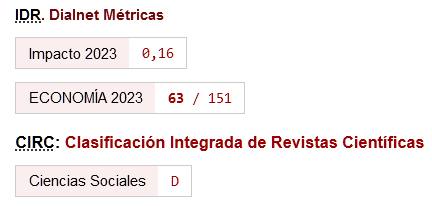Las propuestas para un impuesto europeo sobre el CO2 y sus potenciales implicaciones distributivas entre países
Palabras clave:
impuesto energético, impuesto sobre el carbono, distribución entre países, efectso distributivos, Unión EuropeaResumen
En el presente artículo se revisan las propuestas europeas sobre fiscalidad energética -y, en concreto, sobre un impuesto europeo que grave las emisiones de dióxido de carbono- y las dificultades con que se han encontrado. Se estudian las posibles ventajas e implicaciones que tendría un impuesto, no ya armonizado, sino recaudado a nivel del conjunto de la Unión Europea. Este tipo de impuesto tendría importantes efectos distributivos no solo dentro de los países (como un impuesto armonizado) sino también entre diferentes países. El trabajo estudia dichos efectos potenciales según diferentes modelos concretos de implantación y de destino de los fondos recaudados: un modelo puro sobre el CO2; un modelo 50 % – 50 % energía – CO2; un modelo puro sobre el CO2 pero gravando también la energía nuclear.
Descargas
Citas
ANG, B. W. (1999) "Is the energy intensity a less useful indicator than the carbon factor in the study of climate change?", Energy Policy, vol. 27, 943-946. https://doi.org/10.1016/S0301-4215(99)00084-1
BARANZINI, A., GOLDEMBERG, J. Y SPECK, S. (2000) "A future for carbon taxes", Ecological Economics, vol. 32, pp. 395-412. https://doi.org/10.1016/S0921-8009(99)00122-6
BARKER, T. (1999) "Achieving a 10% cut in Europe's CO2emissions using additional excise duties: coordinated, uncoordinated and unilateral action using the econometric model E3ME", Economic Systems Research, vol. 11, n. 4, pp. 401-421. https://doi.org/10.1080/09535319900000029
BARKER, T. Y KÖHLER, J. (1998) "Equity and Ecotax reform in the EU: Achieving a 10% reduction in CO2emissions using Excise Duties. Environmental Fiscal Reform", Working Paper n.10. University of Cambridge, Cambridge. https://doi.org/10.1111/j.1475-5890.1998.tb00292.x
BIESIOT, W. Y NOORMAN, K.J., (1999) "Energy requirements of household consumption: a case study of The Netherlands", Ecological Economics, vol. 28, n. 3, pp. 367-383. https://doi.org/10.1016/S0921-8009(98)00113-X
BOYD, R., KRUTILLA, K. Y VISCUSI, W.K. (1995) "Energy taxation as a policy instrument to reduce CO2 emissions: A net benefit analysis", Journal of Environmental Economics and Management, vol. 29, pp. 1-24. https://doi.org/10.1006/jeem.1995.1028
BRUCE, J., LEE, H. Y HAITES, E. (eds.) (1996) Climate Change 1995: Economic and Social Dimensions of Climate Change. Contribution of Working Group III to the Second Assessment Report of the Intergovernmental Panel on Climate Change (IPCC), Cambridge University Press, Cambridge.
COMISIÓN EUROPEA (1992) "Propuesta de directiva del consejo por la que se crea un impuesto sobre las emisiones de dióxido de carbono y la energía", COM (92) 226 final, 30 de Junio.
COMISIÓN EUROPEA (1993) "Stable Money-Sound Finances. Community public perspective of EMU", European Economy, n.53.
COMISIÓN EUROPEA (1995) "Propuesta modificada de directiva del consejo por la que se crea un impuesto sobre las emisiones de dióxido de carbono y sobre la energía", COM (95) 172 final, 10 de Mayo.
COMISIÓN EUROPEA (1997) "Propuesta de directiva del consejo por la que se reestructura la estructura comunitaria de imposición de los productos energéticos", COM (97) final, 12 de Marzo.
CONRAD, K. Y SCHMIDT, F.N. (1998) "Economic impacts of an uncoordinated versus a coordinated carbon dioxide policy in the European Union: An applied general equilibrium analysis", Economic Systems Research, vol. 10, n. 2, pp. 161-182. https://doi.org/10.1080/09535319808565472
CORNWELL, A. Y CREEDY, J. (1996) "Carbon taxation, prices and inequality in Australia", Fiscal Studies, vol. 17, n. 3, pp. 21-38. https://doi.org/10.1111/j.1475-5890.1996.tb00492.x
EKINS, P. (1997) "On the Dividends from Environmental Taxation" In: O'Riordan, T. (Ed.) Ecotaxation. Earthcan, London.
EKINS, P.Y BARKER, T. (2001) "Carbon taxes and carbon emissions trading", Journal of Economic Surveys, vol. 15, n. 3, pp. 325-376. https://doi.org/10.1111/1467-6419.00142
EKINS, P. Y SPECK, K. (1999) "Competitiveness and exemption from environmental taxes in Europe", Environmental and Resource Economics, vol. 13, pp. 369-396. https://doi.org/10.1023/A:1008230026880
EUROSTAT (2001) Annuaire Eurostat 2001. Le guide statistique de l'Europe- Données 1989-1999, European Communities, Office for Official Publications of the European Communities, Louxembourg.
HOEL, M. (1992) "Carbon taxes: an international tax or harmonized domestic taxes?", European Economic Review, vol. 36, pp. 400-406. https://doi.org/10.1016/0014-2921(92)90096-F
INTERNATIONAL ENERGY AGENCY (2000) CO2emissions from fuel combustion (2000 edition), OECD/IEA, Paris.
INTERNATIONAL ENERGY AGENCY (2001) Energy Balances of OECD Countries. 1998-1999. OECD/IEA, Paris.
JANSEN, H. Y KLAASSEN, G. (2000) "Economic Impacts of the 1997 EU Energy Tax: Simulations with Three EU-Wide Models", Environmental and Resource Economics, vol. 15, n. 2, pp. 179-197.
https://doi.org/10.1023/A:1008309512349
LABANDEIRA, X. Y LABEAGA, J.M. (1999) "Combining Input-Output Analysis and Micro-Simulation to Assess the Effects of Carbon Taxation on Spanish Households", Fiscal Studies, vol. 20, n. 3, pp- 305-320. https://doi.org/10.1111/j.1475-5890.1999.tb00015.x
LAMBERT, P.J. (1993) The distribution and Redistribution of Income. A mathematical Analysis, Manchester University Press, Manchester.
O'COONOR, M. (1997), "The internalization of environmental costs: implementing the Polluter Pays principle in the European Union", International Journal of Environment and Pollution, Vol. 7, n. 4, pp. 450-482.
ORGANIZATION FOR ECONOMIC CO-OPERATION AND DEVELOPMENT (OECD) (1995) Climate Change, Economic Instruments and Income Distribution. Paris.
ORGANIZATION FOR ECONOMIC CO-OPERATION AND DEVELOPMENT (OECD) (1997) Evaluating Economic Instruments for Environmental Policy. OECD, París.
PEARCE, D. (1991) "The role of carbon taxes in adjusting to global warming", Economic Journal, vol. 101, pp. 938-948. https://doi.org/10.2307/2233865
PEARSON, M. (1995) "The political economy of implementing environmental taxes", International Tax and Public Finance, vol. 2, pp. 357-373. https://doi.org/10.1007/BF00877506
POTERBA, J. (1991) "Tax policy to combat global warming", En Dornbusch, R. y Poterba, J. (Eds.) Global Warming: Economic Policy Responses. MIT Press, Cambridge MA, pp. 71-98.
REYNOLDS, M. Y SMOLENSKY, E. (1977) Public Expenditures, Taxes and the Distribution of Income: The United States, 1950, 1961, 1970, Academic Press, New York.
ROCA, J. Y ALCÁNTARA, V. (2001) "Energy intensity, CO2emissions and the environmental Kuznets curve. The Spanish case", Energy Policy, vol. 29, n. 7, pp. 553-556. https://doi.org/10.1016/S0301-4215(00)00154-3
SCHEER, H. (2000) Economía solar global, Círculo de Lectores, Barcelona.
SMITH, S.(1992) "The distributional consequences of taxes on energy and the carbon content of fuels", European Economy, Special Edition on the Economics of Limiting CO2 Emissions, Commission of the European Economies, pp. 241-268.
SPECK, S.(1999) "Energy and carbon taxes and their distributional implications", Energy Policy, vol. 27, pp. 659-667. https://doi.org/10.1016/S0301-4215(99)00059-2
SYMONS, E., PROOPS, J. Y GAY, P. (1994) "Carbon taxes, consumer demand and carbon dioxide emissions: a simulation analysis for the UK", Fiscal Studies, vol. 15, n. 2, pp. 19-43. https://doi.org/10.1111/j.1475-5890.1994.tb00195.x
WHALLEY, J. Y WIGLE, R. (1991) "The international incidence of carbon taxes", en Rudiger Dornbusch y Poterba, J.M. (Eds), Cambridge, MA: MIT Press, pp. 233-263.
Descargas
Publicado
Cómo citar
Número
Sección
Licencia
Esta licencia permite a terceros compartir (copiar y redistribuir el material en cualquier medio o formato) y adaptar (remezclar, transformar y crear a partir del material para cualquier finalidad, incluso comercial), siempre que se reconozca la autoría y la primera publicación en esta revista (La Revista, DOI de la obra), se proporcione un enlace a la licencia y se indique si se han realizado cambios en la obra.







